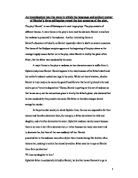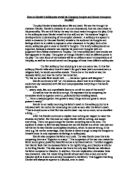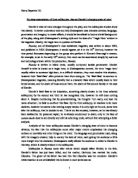feelings which he could not voice in public otherwise. A soliloquy is used for the benefit
of the audience as it is a dramatic device which enables the audience to get a deep insight
into the true thoughts and feelings of the character, as well as get a better understanding
of Hamlet's motives.
In Act1, Scene 2 Hamlet delivers his first soliloquy. He starts his soliloquy by
wishing to die;
"O that this too too solid flesh would melt"
Hamlet is hereby wishing that his skin would rot away and decay, he then goes on
wishing that suicide was not a mortal sin and not against God's orders so that he could
commit it with nothing religious stopping him.
"Or that the Everlasting had not fixed
His canon 'gainst self-slaughter"
It is undoubtedly detectable that Hamlet's first sentences reveal despair and he appears to
desire death. This does not represent Hamlet as a typical revenge hero. A typical revenge
hero would not desire death so quickly and instead of talking about death he would be
thinking about how to get in power, rather than give in so easily. Hamlet thinks of life as
a tedious, degenerate foul place,
"things rank and gross in nature"
It emphasises here that there is nothing in life except repulsive and disgusting beings,
Hamlet could be referring to his mother or Claudius or maybe he is referring to both of
them. He compares the life he is living at present by using the idea of an 'unweeded'
garden as a metaphor. Hamlet is using this imagery to indicate that life in the past was
magnificent, as the king and queen used to be very much in love, life seemed to be
passive, full of happiness and joy. When Old Hamlet was still alive, Prince Hamlet
has never experienced what he is experiencing after his father's dreadful murder.
Life is not what it used to be like in the past.
"Fie on't, ah fie, 'tis an unweeded garden"
The weed in an unweeded garden will grow and spread rapidly; it will multiply and
therefore kill everything that is beautiful in the garden. Life seems just like that for
Hamlet; his father died and then his mother rushed and remarried his father's brother. His
words in this soliloquy represent despair, as if he fears what is to happen next, as the
weed will continue growing.
Hamlet is very much offended by his mother's indecently rushed marriage to
his uncle; her dead husband's brother. Hamlet thinks very highly of his dead father in the
soliloquy
"So excellent a king that was to this"
Hamlet makes use of a very powerful strong imagery when he is talking about the
perfect relationship that his parents had in the past, how his father used to shield and
protect Gertrude from the winds of heaven, even though heaven is a great, beautiful place.
"".. so loving to my mother
That he might not beteem the winds of heaven
Visit her face too roughly"
From of what Hamlet tells us, old Hamlet was very affectionate and gentle towards his
wife and he wanted to protect her from everything no matter how safe it was. This use of
powerful imagery will make the audience sympathise more with Hamlet, especially after
the loss of a wonderful husband, and surely a loving father to his one and only son.
Hamlet compares the brothers with each other; his dead father and his uncle
Claudius. He talks of his father as if he is a Hyperion; as being like the sun-god, without a
blemish. He refers to his uncle as a satyr which is half a man, half a goat, with an
insatiable sexual appetite. This comparison of Hamlet indicates that he thinks very little
of his uncle; he is disgusted by him, especially as Claudius is now in a sexual relationship
with Gertrude, now that she is his wife.
Gertrude, however, did love Old Hamlet very much
"Why? She would hang on him…"
This conveys how passionately Gertrude loved Hamlet's father, yet within a month she
remarried. Her marriage had a huge effect on Hamlet, but what made it worse that she
married her dead husband's brother. This has had huge impact on Hamlet.
".. and within a month-
Let me not think on't"
Hamlet's disgust at his mother's speedy marriage is illustrated in the above quote. His
disgust is mainly based on the fact that Claudius is having a sexual encounter with
Gertrude. Hamlet thinks that his mother was weak and gave in easily; as women were
dominated by men in the Elizabethan times. Gertrude, in that context needed a man in her
life to protect and guide her in every way possible.
"frailty, thy name is woman"
This shows that Hamlet thinks off all women as weak, giving in very easily to please their desires.
Hamlet's love towards his mother is the strongest out of all his mixed feelings. This can
be related to the Oedipus complex, a theory made by the psychoanalyst, Freud, who
proposed that all boys/men have very strong subconscious sexual feelings towards their
mothers.
The theory proposed that boys in their early age will feel deep love towards their mothers,
and therefore have a feeling of hatred towards their fathers as they are in a sexual
relationship with the mother, he does things which they can not do. Boys will notice that
their mother is too busy with the father; they will therefore sometimes wish that their
fathers were dead so that their mother will have as much time as possible for them and so
that they can take their father's role fully. This could be how Hamlet is feeling about the
relationship between his mother and his uncle. Hamlet could subconsciously desire
his mother sexually, these feelings could have a great impact on how Hamlet is thinking
about Claudius.
Hamlet makes another comparison between the two brothers towards the end of
the soliloquy
"My father's brother, but no more like my father
Than I to Hercules-within a month"
These comparisons emphasise that Claudius is the evil man while Old Hamlet is the
best man on earth. However, Hamlet then continues to comparing himself to Hercules. He
underestimates himself as he sees that he has nothing in common with Hercules, he
cannot carry out the tasks assigned to him in the way Hercules could. Hamlet ends his
speech with very ironic words
"But break my heart, For I must hold my tongue"
These words are very ironic to the audience as they realise that Hamlet will not be
permitted to suffer in silence.
The punctuation reflect Hamlet's expression of pain and confusion, this is shown
by the repetition of the "O," with the comma empahsising it.
"O, that this too too solid flesh would melt."
The disjointed rhythm of the play reflects the dislocated progress of Hamlet's thoughts
and inner turmoil. Shakespeare probably did this to show and emphasise the sense of
tension.
In Act2, Scene 2, Hamlet delivers his second soliloquy after observing a play
which consisted great acting by very talented actors. Hamlet feels inadequate and
ashamed of his delay in avenging his father's death.
"O what a rogue and peasant slave am I!"
This quote betrays a deep lack of self-esteem, because of his inactions to avenge his
father's murder. Hamlet compares himself to the actor who cried for Hecuba, who in fact
is a fiction. How this player could mourn, have tears in his eyes and a broken voice for
someone who does not mean anything to them. Hamlet is ashamed of himself for not
having those feelings, as his father has been murdered and he is still doing nothing about
it.
"What's Hecuba to him, or he to Hecuba
That he should weep for her?"
The actor seems to be more committed, passionate by taking their role seriously, whereas
Hamlet is the opposite. Hamlet who has been instructed by his dead father's ghost to
avenge his murder does nothing. Hamlet, therefore, questions himself on whether he is a
coward for not taking any action yet
"Am I a coward?"
Hamlet might not be a coward, but he could be procrastinating; he could be putting things
of. His idea of having the players play something like the murder of his father could have
two meanings to the audience; it could be that Hamlet is using the mere excuse of the
ghost being a devil to stop him from avenging his father's death. Or, it could be that
Hamlet is a good gentleman and therefore does not want to kill anyone innocent, instead,
kill the real murderer. On both cases Hamlet does not seem like a typical revenge hero, as
a revenge hero would not really sit, wait and plan on how to find out the real killer to kill
him. A typical revenge hero would normally run after the information handed to him, to
seek his revenge.
Hamlet's productive thinking makes him want to see for himself whether the king
is guilty or not.
"The play's the thing
Wherein I'll catch the conscience of the king."
Shakespeare put foreword the play within a play. In the play, the audience will be
watching Hamlet, whereas Hamlet will be watching the king and the king will be
watching the murder of Gonzago. Everyone will be watching something, but not
necessarily the same thing, as they all will be focusing on what interests them. This links
to the themes of the play for the reason that the murder of Gonzago is the same as the
murder of old Hamlet.
The language in this soliloquy consisted of less suicide, as he does not talk about
committing suicide like he usually did in his previous soliloquies but much angrier and
harder on himself. Hamlet used very powerful words like
"I am a pigeon-livered, and lack gall"
A pigeon's liver would produce no gall to make someone furious enough to take revenge;
Hamlet's comparison shows how much anger he has towards himself for not taking any
actions. He then goes onto taking the anger towards himself and turning it on his uncle by
saying:
"With this slave's offal. Bloody, bawdy villain!
Remorseless, treacherous, lecherous, kindless villain!"
Here Shakespeare releases Hamlet's fury and rage by using curse words towards
Claudius.
In Hamlet’s most famous soliloquy, a dejected uniformity of tone is noticed as
Hamlet does not mention any names, not his father’s, his mother’s or his uncle’s; Hamlet
also does not mention any plans for revenge. Complex and confusing feelings arise as
Hamlet speaks with these ideas of a philosopher. Shakespeare, who has shown Hamlet to
makes absurd remarks which no other person seems to understand,
but in actual fact has a lot of meaning in them. Hamlet refers to death quite a lot in this
soliloquy using different metaphors, which indicate that he has not substantially moved
since his first soliloquy.
Hamlet’s detailed description of death indicates that he still wishes to die, longs for death,
but what is stopping him from taking any actions, is what is to come after death.
“To be, or not to be, that is the question”
Hamlet wonders on whether to endure or fight against life and all the tasks that are
assigned for him, as he once again has a negative insight of himself. Shakespeare makes
Hamlet question his existence after his father's death, seeing that Hamlet finds life futile
and pointless.
“Or to take arms against a sea of troubles,
And by opposing end them”
Hamlet uses an excellent metaphor in this soliloquy "take arms against a sea of troubles."
This metaphor gives the audience a picture in their minds of how Hamlet is seeing
things, this basically means that problems are never ending and will go on forever. He
feels that by trying to set the world right, it almost feels like committing
suicide, “And by end opposing them” this captures Hamlet’s feelings of being unequal to
the task that he has been given by the ghost. A very interesting point here is that Hamlet
never personalises in ‘I’ or ‘me’, which emphasises that Hamlet is not bothered about
how life affects him, he gives us the impression that he has given up on life and on
thinking of himself and what would affect him.
Hamlet’s words in this soliloquy emphasise that he has a great desire to death, to
stop all the pain and suffering which is surrounding him.
“To die, to sleep-
No more; and by a sleep to say we end
The heart-ache and the thousand natural shocks”
However, Hamlet is troubled and afraid of not knowing what takes place after death; no
one knows what dreams he is going to be tormented by.
“For in that sleep of death what dreams may come”
Near the end of Hamlet’s soliloquy, he decides that thinking stops us from acting; as it
makes us all cowards; something that Hamlet expressed as a general truth.
“Thus conscience makes cowards of us all”
In conclusion, all three soliloquies reveal various details about Hamlet. It is
through Hamlet’s soliloquies that different ideas are revealed; as he is the main character
in the play and as it seems, the cleverest. Hamlet's first soliloquy was emotionally
unstable. Shakespeare portrayed him like this to make the audience feel sorry towards
him and therefore to sympathies with him. When Hamlet delivers his soliloquies, (which
were investigated in this coursework) he becomes much angrier at himself as he has done
nothing to avenge his father's death. The key concerns, which are related to the themes of
the play, are all significantly important to us. We get to interpret the text in our own
private way because of them.
The total amount of words: 2807








